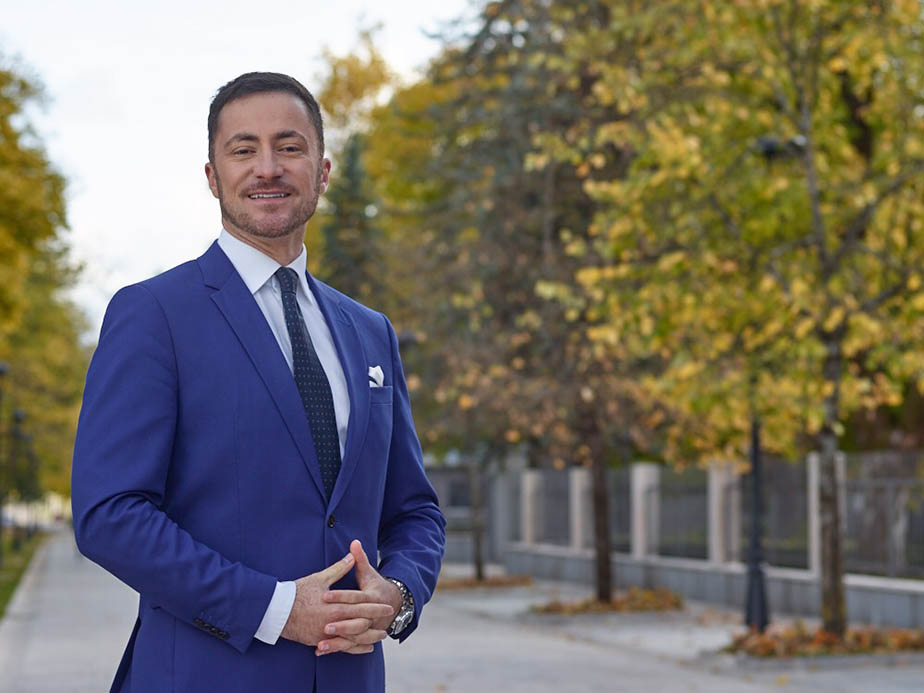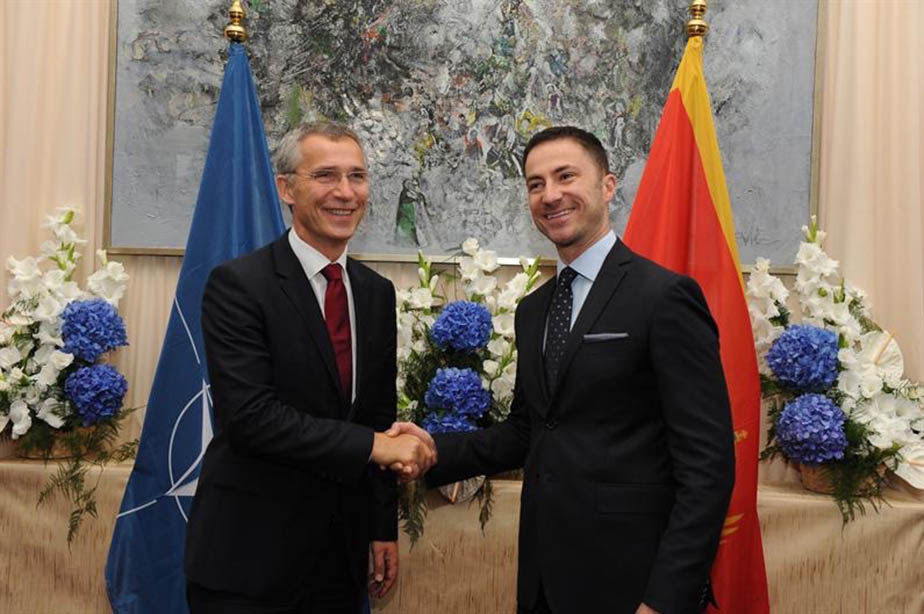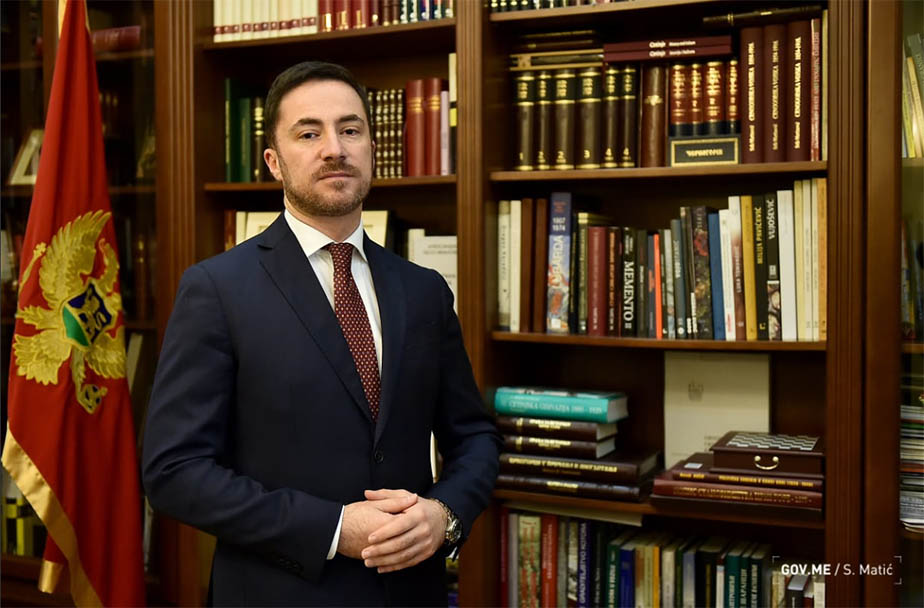
Aleksandar Bogdanović is a Montenegrin politician who is currently the Minister of Culture in Government of Montenegro and former mayor of Cetinje and representative of the Democratic Party of Socialists in Parliament of Montenegro.
Aleksandar was born in the Old Royal Capital of Montenegro – Cetinje. He attended a high school in California, and graduated from the Faculty of Management in Belgrade in 2000, as the best student of the generation. He completed his specialization at the Institute for European Policy in Berlin in 2003, while in 2004, at the invitation of the Secretary of State of the United States, he participated in the spokesperson training program in Washington. He started his career in the Ministry of Economy of Montenegro, where he worked as an advisor to the Minister and Spokesperson for the Ministry. In December 2005, he was appointed Advisor to the President of Montenegro in the field of economic relations, and in 2009 he took up the position of MP, the youngest MP at the time, in the Parliament of Montenegro. He performed the function of the Mayor of the Old Royal Capital of Cetinje from December 2010 to December 2017, when he was appointed Minister of Culture in the Government of Montenegro.
During his past engagement, he was also a member of the Permanent High-Level Group (PHLG) and a representative of Montenegro within the Athens Process. He’s an author and a co-author of several scientific-research projects and professional papers in the field of finance and economic relations. In 2006, he was appointed Youth Spokesperson for Millenium Development Goals in New York, on behalf of the United Nations System. From 2007 to 2011, he was a lecturer at the Faculty of State and European Studies in Podgorica, on the courses Public Sector Economics and EU Public Finance. He was also a guest lecturer at the University of Belgrade, the Diplomatic Academy, and the University of Sofia. Furthermore, he received several significant awards and recognitions, prominent among them being the prestigious award for the Best Mayor of the region in 2014, which he received at the ceremony for the selection of the best manager and the best company of the Southeast and Central European region. The President of Italy, Giorgio Napolitano, even awarded him the Order of the Knight of the Star of Italy in 2014, which is the most significant recognition awarded to foreign citizens for special merits in the promotion of the Italian culture. In May 2017, Aleksandar was named an honorary citizen of Miami Beach, Florida.
Global Millionaire magazine recently caught up with Aleksandar and here’s what went down:
What do you like most about being the minister of culture of Montenegro?
To perform this responsible function is a great honour, a great responsibility, and, at the same time, a demanding task, which I was entrusted with by President and Prime Minister, who I am immensely grateful to for the trust they placed in me. The fact that I have the opportunity to contribute to the prosperity of culture in Montenegro with a team of exceptional associates, with my wholehearted engagement, ability, and creativity on a daily basis, gives me the greatest satisfaction in performing my ministerial function.
What has been the most memorable experience of being the Minister of Culture?
Creating conditions for the Montenegrin society to be enriched with culture is certainly an invaluable experience for me. The Montenegrin culture has a long and extremely rich tradition, and it has always shared the challenges and successes that our society and the country have gone through. In this context, the opportunity to be, so to speak, “on the spot” when it comes to implementing a successful cultural policy based on clear and highly valued goals of the entire Montenegrin cultural being, makes me extremely proud to run this department.

What is the toughest decision you had to make in the last few months?
The past months have been and, unfortunately, still are, very difficult for the whole of mankind, as we are witnessing the relentless struggle of the planet with the COVID-19 pandemic, which has paralyzed all segments of society and human activity. At the global level, the pandemic has called into question the sustainability of many sectors, so the field of culture has not remained immune to these challenges. In order to protect human health, every day we witness that a lot of large and well-known world projects in culture are canceled, prolonged, or change their organizational and production form. The culture in Montenegro also shares the destiny of cultural events in the world, because we are in no way specific as regards the global epidemiological trends. In that context, at the end of March, in the first wave of the pandemic, in accordance with the recommendations of the National Coordination Team for Infectious Diseases, we were forced to decide to close the doors of theatres, galleries, museums, cinemas, libraries, suspend the implementation of projects. festivals … Although the decision was made in order to preserve the health of Montenegrin citizens, I must admit that personally, I find it very difficult.
To what extent were your notions of culture and cultural policy accepted by the rest of the government on an ideological and philosophical level?
From the beginning of my term of office, I have tried to affirm culture as a development opportunity for Montenegro – both in the field of further building the image of our country in the wider area, and in the fields, such as tourism. In that regard, I needed strong cooperation with all entities, especially with local ones, given that each part of Montenegro has unique cultural features that deserve wider recognition. In the implementation of such a defined vision of cultural policy, I had the undivided support and understanding of both the President and Prime Minister and the rest of the Government. In addition, on the philosophical level, as you say, we share the same notions of culture, which means that for the Government of Montenegro, culture represents much more than how most people experience it today – only through art. Culture is actually the most permanent foundation of the Montenegrin identity and collective memory of our country, one of the main pillars for building a more humane society at the general level, but also everything that makes us able to enjoy the complex diversity of human expression.
If you were to look back on your term and make an assessment, what were you pleased about and what left you disappointed?
In the almost past three years as Minister of Culture, I am primarily satisfied because we have increased investment in culture, improved spatial and infrastructural conditions in a number of institutions, but also detected potentials in the field of heritage that we have valorised in the context of cultural tourism, so now we have the first opened creative hubs in Montenegro in places that only yesterday were neglected buildings. Moreover, we have encouraged the development of creative industries, and in artistic creation, we have recognized the projects and authors whose creativity exceeds the local significance and whose poetics correspond to current artistic developments in the world. All this certainly represents a good impetus for even more dynamic and diverse development of the cultural and artistic scene in Montenegro. I believe that a healthy dose of self-criticism is a valuable driver to move forward, so I always think that things can and must be done better.
What kind of knock-on effects will the growth of the media sector have on the economy of Montenegro?
Any conversation on the topic of the media is naturally an adequate conversation on the topic of democratic organization of a society in which freedom of expression is a fundamental human right. Freedom of the media for the Government of Montenegro is the basis of a democratic society because only the free and independent media affirm what is a public good and the progress of civilization. In this context, the development of the media sector in Montenegro is a benefit not only for the economy but for our society as a whole. Since the field of media belongs to the Ministry of Culture, let me emphasize our direct contribution to the improvement of the media legislation in Montenegro. Namely, as a result of a well-thought-out media strategy, two media laws were adopted in the Montenegrin Parliament in August – the Law on National Public Broadcaster RTCG and the Law on Media, which represents a step forward in this area, since as an umbrella law, it guarantees the right to freedom of expression, freedom, and independence of the media in a pluralistic environment, and is based on the highest European standards and principles of transparency, inclusiveness, non-discrimination … I would also like to point out that in the past 18 years, since the last revision of the media legislation, Montenegro has been continuously evolving, in normative, institutional and democratic terms, on the path of creation and sustainability of the overall environment of media freedom, so the achieved level of media reforms and implementation of the European legal heritage, was generally assessed as a good level of legal compliance by international organizations.

What new actions are planned to further boost tourism in your country?
I believe that the health situation at the global level will stabilize soon and that we will all continue where we left off when it comes to tourism, because, as everywhere, the COVID 19 pandemic has had a negative impact this year on the tourist season in Montenegro. The recovery of the tourism sector is extremely important for the Montenegrin society because tourism is the most important component of the national economy. Given the existing potentials, especially natural ones, and the current level of development of the tourism industry, as well as the strategic direction of the development of Montenegro as an ecological state, tourism should be one of the most promising activities in the future economic development of Montenegro. The development of elite tourism, investments of foreign capital in infrastructure, intensive promotional campaign in foreign markets, and the entry of global brands on the domestic market have contributed to the positive trends in the tourism industry of Montenegro. To achieve even better effects, time and significant investments are required. The principles on which our strategy for further development of Montenegrin tourism is based are the highlighting of comparative advantages of Montenegro, differentiation of regions, standardization according to international standards, individualization of offer and differentiation of offering of each tourist resort, then increase in hotel accommodation capacity according to international standards of hotel units, which will satisfy the complex requirements of foreign guests. We have also recognized the great potential in further development in connecting the tourism sector with other economic activities, but also through cultural tourism, which the Ministry of Culture wholeheartedly advocates.
Deseasonalisation is one of the most important objectives for any tourist destination. Which segments and activities are helping to boost the number of visitors to Montenegro throughout the year?
Montenegro is a small country in the area, but it has an enormous wealth of natural resources: impressive mountain ranges and deep canyons, wide plains, fast rivers, Skadar Lake, and the magnificent coast of the Adriatic Sea alternate in just a few-hour ride by car. The coast and the mountains, due to their proximity to each other, are perceived as a single whole, and this is the main comparative advantage of Montenegro in the rich tourist offer among the competition, but also when it comes to deseasonalisation. Moreover, selective forms of tourism: nautical, rural, cultural, and eco-tourism, combined in a single tourist product, increase the number of visitors to our country throughout the year and, at the same time, contribute to the balanced tourist valorisation of all regions. In addition, Montenegro has a pleasant summer climate, similar to that on the Cote d’Azur, which makes it ideal for bathing tourism, while the winter in our mountains is characterized by excellent conditions for all kinds of winter sports.
Globalisation and new technologies have driven many of the changes in world tourism over the last decade. What other challenges will influence the future of the sector in your country?
In a relatively short time, Montenegro has proven itself in relation to competitive destinations in the Mediterranean region, owing primarily to the extraordinary natural beauty and favourable geographical and other climatic conditions, but also a prudent policy pursued by the Government of Montenegro in this area, as well as the efforts and achievements of tourism service providers. In this area, we have reached the international level of service quality, but also met expectations when it comes to valorisation and protection of natural resources, sustainability, and innovation. We are witnessing that globalization is rapidly changing consumer behaviour, developing transport and information technology, modifying forms of organization and labour, which all have a strong impact on tourism. In that context, the most obvious challenge of Montenegrin tourism in the future will be reflected in its ability to economically valorise numerous non-economic resources, but also in its generating and integrative function in relation to complementary sectors and non-economic activities. It is because tourism is defined today, in the global sense as well, by the desire to create partnerships in three sectoral levels (public, private and civil), with the goal of strategic development of the tourism industry and the use of resources for the economic growth of society.
Please could you also send us more information on Montenegro, in the following areas:
1) The most important places to visit.
The entire Montenegro is a genuine tourist pearl that you must visit. Beautiful mountain massifs, deep canyons of restless rivers, crystal blue sea with endless beaches, numerous lakes, but also the immense richness of its cultural heritage enable even the most demanding visitor to our country to find the best way to enjoy a quality vacation. In just one day, you can have a morning coffee on the Long Beach of Ulcinj, a tour of Kotor – a city from the UNESCO World Heritage List, lunch during a cruise on Skadar Lake, and finish it by a fireplace and with specialties of the national cuisine on the slopes of Mount Durmitor.
I hope you won’t mind, but I will also be a bit of a local patriot, so I will wish your readers, when they come to Montenegro, to visit its old royal capital, my hometown – Cetinje, located at the foot of Lovćen. The story of a town-museum, the centuries-old capital of Montenegro, and the origin of its spirituality and statehood has lasted for more than half a millennium, a town which, both with its cultural heritage and significance in artistic terms, transcends the national boundaries. Each stone of this small town has its own historical story or legend, and the patina of centuries deposited on the buildings of Cetinje carries freedom messages from past times, making it both great and famous. You will find evidence of this in the museums of Cetinje, which keep valuable testimonies of the centuries-old struggles of its defiant and proud citizens for freedom and for the rise of their own spirit through the written word and through tradition.
2) The main reasons and incentives for investors to invest in Montenegro.
Montenegro, as a small and highly open economic system, has the potential to flexibly fit into the global trends in FDI movements (Foreign Direct Investment), so it is continuously committed to improving its overall investment environment in this regard. Attracting foreign investments is one of our primary goals, taking into account their positive effect on the dynamization of production and the creation of new jobs, through the establishment of new companies. Here are a few reasons for investing in Montenegro – because of political, monetary, and macroeconomic stability; simple START UP; the liberal economic regime of foreign trade; favourable tax policy; international accounting standards; growth of economic freedoms and, above all, excellent geographical position and climatic conditions that make our country a rare gem in this part of Europe.